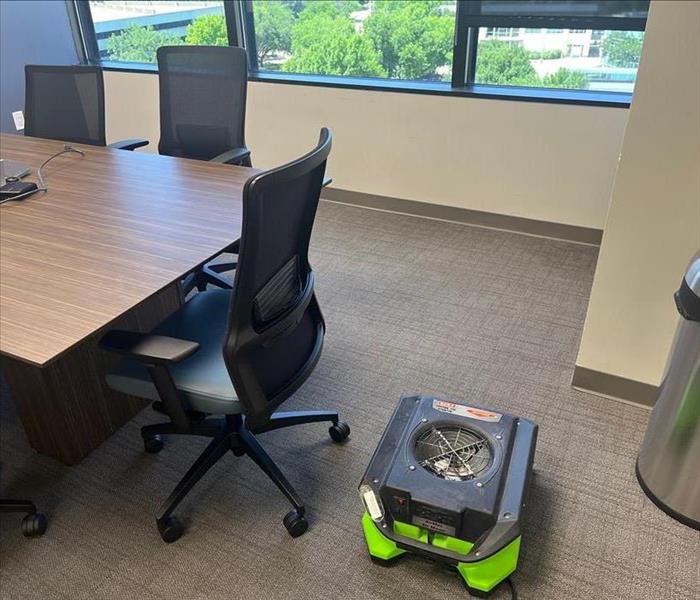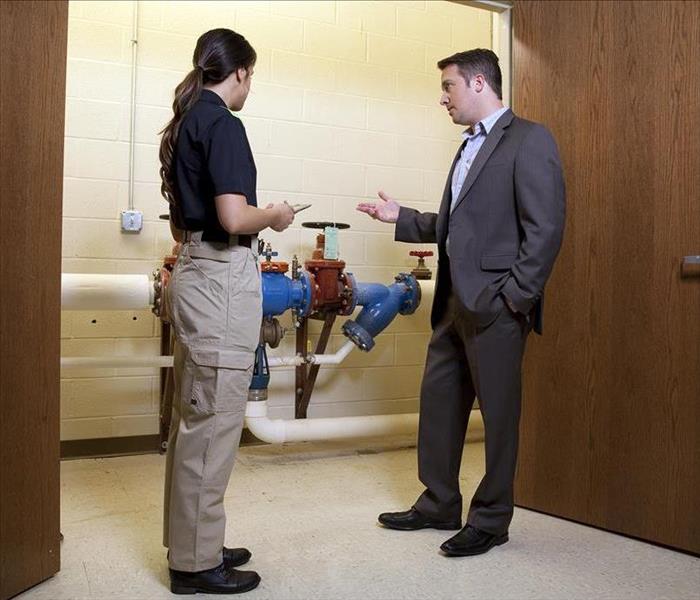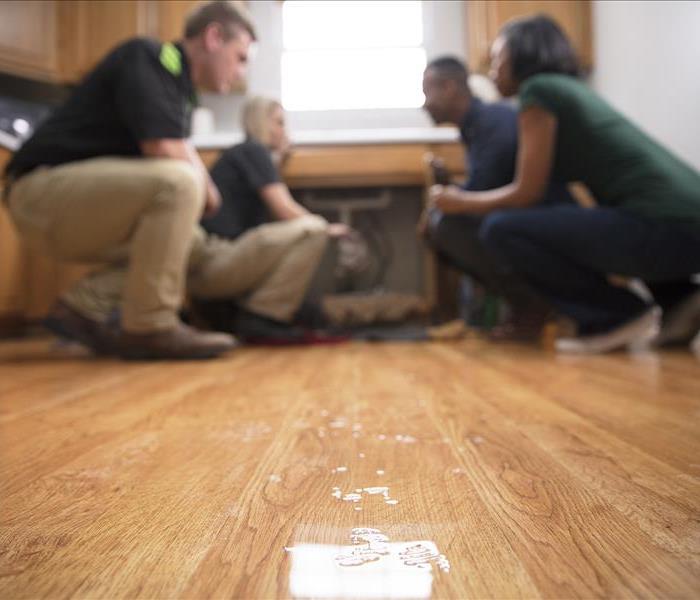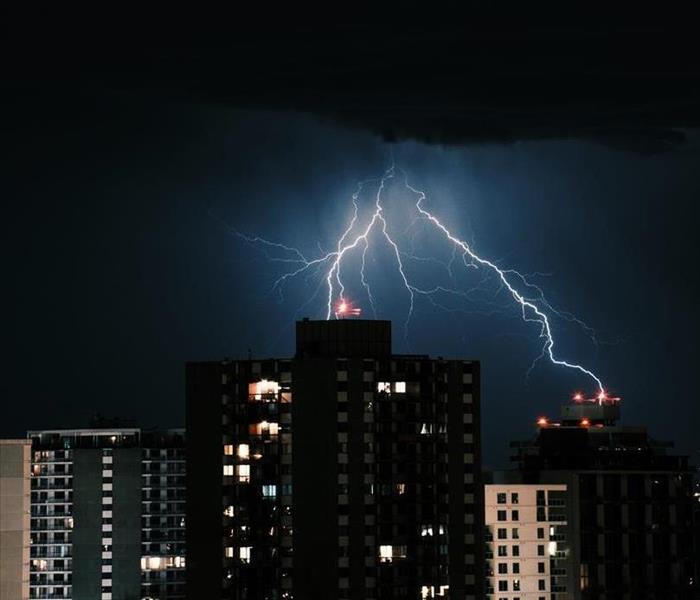Archived Storm Damage Blog Posts
Storm Damage in SW Irving
7/23/2024 (Permalink)
 Commercial Storm Damage caused by a recent storm.
Commercial Storm Damage caused by a recent storm.
At SERVPRO of Southwest Irving, we understand that when a storm hits, your business can't afford to wait. Every hour spent on recovery is an hour of lost revenue and productivity. That's why we're here to help you get back on your feet as quickly as possible.
Our Services Include:
- Emergency Response: Our team is available 24/7 to respond to your call and begin the restoration process immediately.
- Water Damage Restoration: From water extraction to drying and dehumidification, we ensure your property is restored to its pre-storm condition.
- Structural Repairs: We handle everything from minor repairs to major reconstruction, ensuring your building is safe and secure.
- Mold Remediation: Prevent mold growth and ensure a healthy environment for your employees and customers.
- Contents Restoration: We restore valuable items and important documents that have been damaged by the storm.
Why Choose SERVPRO of Southwest Irving?
- Fast Response: We know that time is of the essence, and our team is dedicated to providing swift and efficient service.
- Expert Team: Our technicians are highly trained and certified, ensuring your property is in the best hands.
- Advanced Equipment: We use the latest technology and equipment to provide the highest quality restoration services.
- Customer Focused: Your satisfaction is our top priority. We work closely with you to make the restoration process as smooth and stress-free as possible.
- Don’t let storm damage put a damper on your business. Call SERVPRO of Southwest Irving today
The more you know, the better.
4/29/2022 (Permalink)
 We handle it for you!
We handle it for you!
We know that storms are always chaotic and that knowledge is invaluable when a disaster approaches; having a plan to keep us safe is of the utmost importance, so here are some tips about thunderstorms.
A thunderstorm is considered severe if it produces hail at least 1 inch in diameter or has 58 miles per hour wind gusts.
Every thunderstorm produces lightning, killing more people each year than tornadoes or hurricanes. Heavy rain from thunderstorms can cause flash flooding, and high winds can damage homes and blow down trees and utility poles, causing widespread power outages.
Severe thunderstorm watch:
Severe thunderstorms are possible in and near the watch area. Stay informed and be ready to act if a strict thunderstorm warning is issued.
Warnings indicate imminent danger to life and property. Unfortunately, people are killed or seriously injured by severe thunderstorms every year despite warnings. While some did not hear the warning, others listened to the warning and ignored it. The information in this section, combined with timely watches and warnings about severe weather, may help save lives.
The above is of the utmost importance since sometimes we do not measure the great chaos that this can cause; hoping you consider all these factors.
If you are in that situation, don't hesitate to contact us, and we'll be right away.
How to Prepare for a Storm
4/27/2022 (Permalink)
 HERE TO HELP!
HERE TO HELP!
Storms can be as unexpected as the damage they cause. With the proper preparation, much of the storm damage can be minimized or prevented altogether. Here are some tips to help prevent the damages storms may cause.
Clean Your Gutters
When it rains, and your gutters are clogged, it could cause the overflow to run down into your home. Often, this water can go undetected and sit. Over time, mold can grow in these areas that remain wet having clean and sturdy gutters before the rain can minimize the damage a storm may cause.
Landscaping and drainage
Depending on the land your home is built on, water runoff can accumulate around your foundation and flood your homes. Fortunately, there are solutions to proper landscaping.
Better pathways can be created for water runoff, guiding the water away from your home. If you have noticed puddles or water accumulation near your home when it rains, contact a professional to help before a storm.
We have 24-7 service 365 days. Contact us!
Winter storm
4/13/2022 (Permalink)
 Unexpected winter storm
Unexpected winter storm
Hundreds of people get injured each year by exposure to cold, vehicle accidents on wintry roads, and fires caused by improper heaters. Prepare now so you can stay safe during winter storms.
-Listen to local news channels for critical information on snowstorms and blizzards from the National Weather Service.
-Avoid driving when conditions include sleet, freezing rain, snow, or dense fog.
-If travel is necessary, make sure you have a disaster supplies kit in your vehicle, which includes: a shovel, blanket, flashlight, water, snacks, first aid kit, extra batteries, and a sack of sand or cat litter.
-Before tackling strenuous tasks in cold temperatures, consider your physical condition, the weather factors, and the nature of the job.
-Heating fires are the second leading cause of home fires. Keep all potential fuel sources like paper, clothing, bedding, or rugs at least three feet away from space heaters, stoves, or fireplaces.
-Portable heaters and fireplaces should never be left unattended. Turn off space heaters and make sure any embers in the fireplace get extinguished before going to bed or leaving home.
-If you must use a space heater, place it on a level, hard and nonflammable surface (such as ceramic tile floor), not on rugs or carpets or near bedding or drapes. Keep children and pets away from space heaters.
-Keep fire in your fireplace by using a glass or metal fire screen large enough to catch sparks and rolling logs.
Your safety comes first; it is essential to take the measures we recommend; we have teams ready to help you with any inconvenience, and be prepared.
Tornadoes Damage Facts
4/13/2022 (Permalink)
 “Tornadoes cause around 70 fatalities and 1,500 injuries in the U.S. each year.”
“Tornadoes cause around 70 fatalities and 1,500 injuries in the U.S. each year.”
Nature can take a violent turn without warning: floods, wildfires, tornadoes. Any of these can have a devastating effect on your home; that’s why we share with you some facts for you to know if any of these happens to you.
Here are some facts about tornadoes:
Have in your mind some of the signs of a tornado:
- Dark-greenish sky
- Large hail
- Dark, larges, low-lying clouds
- Roars
The average forward speed is 30 mph but may vary from nearly stationary to 70 mph. Waterspouts are tornadoes that form over warm water. They can move onshore and cause damage to coastal areas.
Tornadoes can be more than one mile wide and stay on the ground for over 50 miles. Peak tornado season in the southern states is March through May; in the northern states, it is late spring through early summer.
We recommend being prepared for this, having an emergency kit in your home, with a lamp, batteries, medicine, a backpack with a change of clothes, etc. So you should always be prepared.
When a storm damages your home, we’re one call away. With more than 1,900 locations, SERVPRO of Southwest Irving is waiting to serve you 24/7.
What to do when having a flooding
4/13/2022 (Permalink)
 Flooding
Flooding
Water problems are a nightmare for homeowners, especially when they lead to significant flooding. Dealing with water or flood damage is time-consuming and expensive; that's why we share with you five things you must do or check for your home.
1. Call Your Insurance
Your home insurance can help you cover the costs of damage. However, if you ignore a water damage issue for too long, you could find it a struggle to make a claim. In addition, your insurance provider might not be happy to hear how long you waited to address the issue and contact us to solve the problem.
2. Time Matters, Act Quickly!
An issue with ignoring water damage is that it can worsen and happen faster than you would imagine. It may not look like much now, and you might think that it will not get any worse. But if there's an ongoing cause that you do not know exists, you might find it quickly more significant.
Sometimes you can't even see it. Try to analyze your water bills, always be aware of the estimate you always pay; if someday it's higher, you could have a water leak somewhere.
3. Protect Yourself and Your Possessions
If there's a storm and your house is flooded, you should think quickly and do these things:
- Protect yourself and your possessions, like electric appliances, important documents, etc.
- Turn off the electricity
- If you're in danger of flooding, evacuate the flooded area until authorities deem it safe to return.
4. Get to Known Your House To The Fullest
The source of the water problem must be identified and stopped to prevent the damage from compounding.
The most likely cause of water damage is a burst pipe or water heater tank leak; in these cases, it's essential to know where the valves, keys, or lights switches are.
5. Contact us, and we'll help you, "Like it never even happened."
Call us as soon as possible after the damage occurs, and find out what steps the insurance company requires you to take so you know what your insurance covers; we'll assist you with an estimate and pictures and be in contact with your insurance.
"We want you to be back in your restored home as quickly as possible. Whether you have minor storm damage or something larger to deal with, we have the experience and the equipment needed to clean up and restore your home and help get life back to normal following storm damage." - SERVPRO.
Thunder storm
4/7/2022 (Permalink)
 We can prevent disaster caused by thunder storms
We can prevent disaster caused by thunder storms
Each year the USA experiences over 100,000 thunderstorms, and while the most significant threat extends from Minnesota to Texas, every state can be at risk with little to no warning. To protect yourself, your family, and your home from the dangers of a thunderstorm, you can consider these safety tips:
- Avoid contact with water during a thunderstorm. Don´t bathe, shower, wash dishes, or have any other contact with water during a thunderstorm. Lightning can travel through plumbing.
- Avoid using electronic equipment of all types. Lightning can travel through electrical systems and radio and television reception systems.
- Avoid using corded phones. Corded phones are not safe to use during a thunderstorm. However, cordless or cellular phones are safe to use during a storm.
- Avoid concrete floors and walls. Don´t lie on concrete floors during a thunderstorm. Also, avoid leaning on concrete walls. Lightning can travel through any metal wires or bars in concrete walls or flooring.
- Stay away from windows, skylights, and doors.
- If you have advanced notice of a storm, consider turning off circuit breakers to avoid power surges that may occur from a lightning strike.
We have the necessary equipment to help you. If you find any alert caused by this storm, do not hesitate to call us, and we will come with all our specialized team to put ourselves at your service.






 24/7 Emergency Service
24/7 Emergency Service






